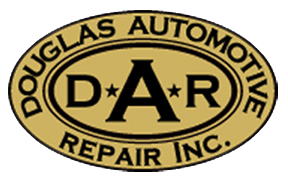
Douglas Automotive Repair strongly recommends that all vehicle owners check six key systems before the temperatures start to drop.
- Battery –Keep the battery connections clean, tight and corrosion-free. Cold weather is hard on batteries – we can check the battery and charging system for optimum performance. Batteries don’t always give warning signs before they fail completely so it’s wise to replace batteries that are more than three years old.
- Antifreeze – Antifreeze (coolant) should be flushed and refilled at least every two years in most vehicles. As a reminder, do not add 100 percent antifreeze as full-strength antifreeze actually has a lower freeze point than when mixed with water.
- Brakes – Have the brakes checked. The braking system is the vehicle’s most important safety item and is key while driving on icy or snow-covered roads.
- Tires – Check the tire tread depth and tire pressure. If snow and ice are a problem in your area, consider special tires designed to grip slick roads. During winter, tire pressure should be checked weekly as tires will lose pressure when temperatures drop.
- Oil – Be diligent about changing the oil and filter at recommended intervals. Dirty oil can spell trouble in winter. Consider changing to low-viscosity oil in winter, as it will flow more easily between moving parts when cold. Drivers in sub-zero driving temperatures should drop their oil weight from 10-W30 to 5-W30 as thickened oil can make it hard to start the car. Have your technician check the fuel, air and transmission filters at the same time.
- Wiper Blades – Cold weather can affect the life of windshield wipers. Freezing temperatures can make the rubber hard and brittle and increase the potential for cracks. Wiper blades that are cracked or torn, or that chatter, streak and don’t properly clean your windshield, should be changed. Some manufacturers offer special winter blades that have a rubber boot covering the arm assembly to keep snow and ice out. When changing the blades, have the windshield wiper system nozzles cleaned and adjusted if necessary, and check the windshield washer reservoir in case it needs fluid.
Checking these six key systems in your vehicle ahead of time will give you confidence when you’re driving in brutal winter conditions. Vehicle maintenance is always more convenient when you’re doing it on your schedule, and a few easy preventive measures can save you the headaches and cost of an emergency breakdown.
During the winter, Douglas Automotive Repair recommends keeping your vehicle’s gas tank at least half full as that decreases the chances of moisture forming in the gas lines and possibly freezing.
Finally, if you’re due for a tune-up, consider having it done before winter sets in. Winter magnifies existing problems such as pings, hard starts, sluggish performance or rough idling.
Are you ready for winter? Give us a call today!
This entry was posted in Vehicle Maintenance, Winter and tagged Safety, Winter Vehicle Maintenance on .
